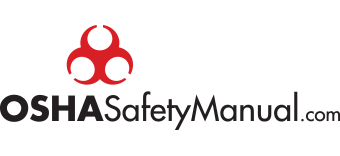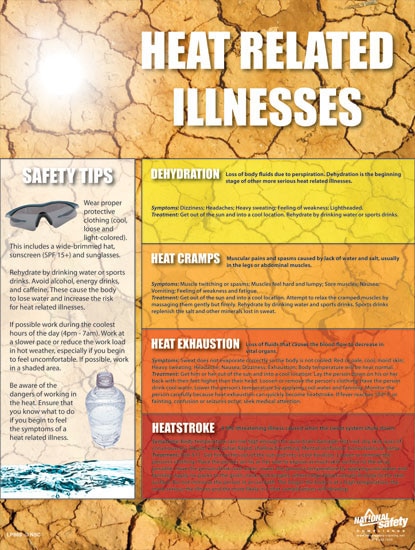Description
Full Color Motivational Safety Poster 18″ x 24″ Laminated
HEAT RELATED ILLNESSES
SAFETY TIPS
Wear proper protective clothing (cool, loose and light-colored). This includes a wide-brimmed hat, sunscreen (SPF 15+) and sunglasses.
Rehydrate by drinking water or sports drinks. Avoid alcohol, energy drinks, and caffeine. These cause the body to lose water and increase the risk for heat related illnesses.
If possible work during the coolest hours of the day (4pm – 7am). Work at a slower pace or reduce the work load in hot weather, especially if you begin to feel uncomfortable. If possible, work in a shaded area.
Be aware of the dangers of working in the heat. Ensure that you know what to do if you begin to feel the symptoms of a heat related illness.
DEHYDRATION
Loss of body fluids due to perspiration. Dehydration is the beginning stage of other more serious heat related illnesses.
Symptoms: Dizziness; Headaches; Heavy sweating; Feeling of weakness; Lightheaded.
Treatment: Get out of the sun and into a cool location. Rehydrate by drinking water or sports drinks.
HEAT CRAMPS
Muscular pains and spasms caused by lack of water and salt, usually in the legs or abdominal muscles.
Symptoms: Muscle twitching or spasms; Muscles feel hard and lumpy; Sore muscles; Nausea; Vomiting; Feeling of weakness and fatigue.
Treatment: Get out of the sun and into a cool location. Attempt to relax the cramped muscles by massaging them gently but firmly. Rehydrate by drinking water and sports drinks. Sports drinks replenish the salt and other minerals lost in sweat.
HEAT EXHAUSTION
Loss of fluids that causes the blood flow to decrease in vital organs.
Symptoms: Sweat does not evaporate correctly so the body is not cooled; Red or pale, cool, moist skin; Heavy sweating; Headache; Nausea; Dizziness; Exhaustion; Body temperature will be near normal.
Treatment: Get him or her out of the sun and into a cool location. Lay the person down on his or her back with their feet higher than their head. Loosen or remove the person’s clothing. Have the person drink cool water. Lower the person’s temperature by applying cool water and fanning. Monitor the person carefully because heat exhaustion can quickly become heatstroke. If fever reaches 102º F, or fainting, confusion or seizures occur, seek medical attention.
HEATSTROKE
A life-threatening illness caused when the sweat system shuts down.
Symptoms: Body temperature can rise high enough to cause brain damage; Hot, red, dry skin; Loss of consciousness; Rapid, weak pulse; Rapid, shallow breathing; Mental confusion; Convulsions or coma.
Treatment: Dial 911. Get him or her out of the sun and into a cool location. Loosen or remove the person’s clothing. Place the person on his or her side to expose as much skin surface to the air as possible. Have the person drink cool water. Lower the person’s temperature by applying cool water and fanning. Apply ice packs to
the groin, neck, and armpits, where large blood vessels lie close to the skin surface. Do not immerse the person in an ice bath. The longer the body is at a high temperature, the more serious the illness and the more likely it is that complications will develop.



